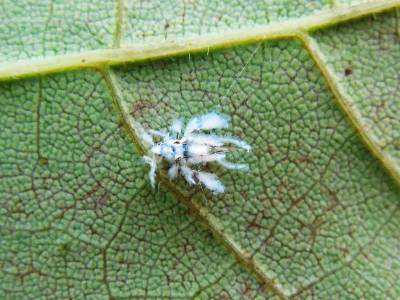What Is This Sticky Stuff?
Benton, Ark. – Hackberry trees have been great shade trees for years, until the last 20 years or so , when an invasive pest from China, the Asian Wolly Hackberry Aphid, was accidentally brought into the U.S.
We have many different species of aphid, but this one stands out, and it only attacks Hackberry or Sugarberry trees. It seems to be more aggravating than the other aphids. I guess because Hackberry trees can get quite large and over shadow our homes and outside areas we frequent.
These aphids produce large amounts of honeydew, the sticky substance that covers the leaves and also falls onto your car and patio and toys and anything else it can mess up.
The aphids do not actually hurt the trees, although after being covered by them, the honeydew will have a black sooty mold grow on the leaves and ruin the looks of the tree.
Aphid populations are hard to predict each year, but the last two summers they have been abundant. There are predatory insects that feed on the aphids, but there are never enough predators when you need them. The recommendation for control is to drench around the tree with a systemic insecticide. This is not a reliable treatment due to getting enough insecticide into a large tree and at the time when the aphids are present is difficult.
The Asian Wooly Hackberry Aphid is easy to distinguish because its name gives it away. When flying they look like pieces of cotton in the air. Another of nature’s phenomenon, but what a mess it causes.
Media Contact: Saline County Agent
Ron Matlock, County Extension Agent - Staff Chair
U of A Division of Agriculture
Cooperative Extension Service
1605 Edison Ave., #15, Benton, AR 72015
501-303-5672
rmatlock@uada.edu
Related Links
The Arkansas Cooperative Extension Service is an equal opportunity/equal access/affirmative
action institution. If you require a reasonable accommodation to participate or need
materials in another format, please contact your County Extension office (or other
appropriate office) as soon as possible. Dial 711 for Arkansas Relay.
The Arkansas Cooperative Extension Service offers its programs to all eligible persons
regardless of race, color, sex, gender identity, sexual orientation, national origin,
religion, age, disability, marital or veteran status, genetic information, or any
other legally protected status, and is an Affirmative Action/Equal Opportunity Employer.
